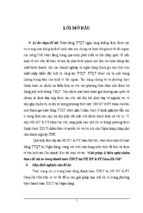Website: http://www.docs.vn Email :
[email protected] Tel : 0918.775.368
NATIONAL ECONOMICS UNIVERSITY
Faculty of International Education
IBD program
--- ---
PROJECT
Topic:
PRONUNCIATION ENGLISH PROBLEM OF
IBD STUDENTS
Lecturer
Student
Class
: Le Thi Thu Mai
: Nguyen Giang My
: I4P Intake Spring
Hanoi - 2010
-0-
Website: http://www.docs.vn Email :
[email protected] Tel : 0918.775.368
Acknowledgements
I would like to express my gratitude to all those who help me to complete my own
project.
I wish to thank my family for their encouragement and support. I have furthermore to
thank my friends, especially; all of IBD students whose help, simulating suggestions, support
helped me in all the time of writing my project.
Finally, I would like to gratefully acknowledge my deep indebtedness to my
supervisor, Miss Le This Thu Mai, who has supplied with great deal of enthusiastic assistance
in guiding me how to do a project, display the project on PowerPoint scientifically and was a
great help in giving useful advice in difficult times through proofreading my project and
listening my trouble carefully.
Nguyen Giang My
-1-
Website: http://www.docs.vn Email :
[email protected] Tel : 0918.775.368
Content
CHAPTER I: INTRODUCTION ....................................... - 4 I. BACKGROUND: ............................................................................................................. - 4 II. RATIONALE: ................................................................................................................. - 4 III. OBJECTIVES: ............................................................................................................... - 5 IV. SUBJECTS: ................................................................................................................... - 5 V. METHODOLOGY: ........................................................................................................ - 5 1. Questionnaires: ............................................................................................................ - 5 2. Interviews: ................................................................................................................... - 5 3. Observation: ................................................................................................................ - 6 VI. RESEARCH QUESTIONS: .......................................................................................... - 6 CHAPTER II: LITERATURE REVIEW ......................... - 7 I. OVERALL CONCEPTIONS OF PRONUNCIATION: .................................................. - 7 1. Definition of pronunciation:........................................................................................ - 7 2. The sound relationships of pronunciation: .................................................................. - 7 II. THE IMPORTANT ROLES OF CORRECT PRONUNCIATION................................ - 8 1. Making effective communication and good impression: ............................................ - 8 2. Making efficient work:................................................................................................ - 9 3. Supporting listening skill ............................................................................................ - 9 CHAPTER III: MAJOR FINDINGS ............................... - 10 I. REAL PRONUNCIATION PROBLEM OF IBD STUDENTS: ................................... - 10 1. Syllable pronunciation: ............................................................................................. - 10 2. Stress: ........................................................................................................................ - 12 3. Intonation: ................................................................................................................. - 12 II. THE REASONS FOR THE PRONUNCIATION PROBLEM: ................................... - 13 1. The dissimilarities between Vietnamese and English language: .............................. - 13 2. Wrong self-study method: ......................................................................................... - 14 3. Method of teaching: .................................................................................................. - 16 4. The factor of psychology: ......................................................................................... - 16 III. SOLUTIONS FOR THIS PROBLEM: ........................................................................ - 16 -
-2-
Website: http://www.docs.vn Email :
[email protected] Tel : 0918.775.368
1. Building worthy learning strategy with worthy schedule and plain targets: ............. - 16 2. Choosing suitable way of training pronunciation skill: ............................................ - 17 3. Invest teaching time in pronunciation: ...................................................................... - 19 CHAPTER IV: CONCLUSION ....................................... - 20 CHAPTER V: RECOMMENDATION ........................... - 21 CHAPTER VI: REFERENCE .......................................... - 22 -
-3-
Website: http://www.docs.vn Email :
[email protected] Tel : 0918.775.368
CHAPTER I: INTRODUCTION
I. BACKGROUND:
In recent years, according to globalization trends and new challenges, Vietnam may have
to face lots of difficulties. Thus, Vietnamese government has co-operated and established
diplomatic relations with 168 countries in all continents. In addition, Vietnam has also
participated in many large organizations such as, ASEAN, APEC, ASEM and more than 500
non-governmental organizations in order to learn from countries’ experiences to help Vietnam
to develop in all aspects. Another significant example is Vietnam has become the WTO’s
150th member since 2007. Following these analyses, the use of English as an international
language to communicate with foreign people is necessary than ever before. However,
learning a new language is not easy, because of many different points which are not similar to
mother tongue, Vietnamese language. One of the most considerable points is pronunciation
which is noticed a lot by English learners. It is the biggest challenge when using English in
daily communication as well as at work or at universities, because a word is pronounced
incorrectly or wrong intonation which may lead to misunderstandings of listeners. These
sometimes bring unexpected effects or even break good relationships. Therefore, the project
focuses on problems of pronunciation.
II. RATIONALE:
At present, Vietnamese people are having various ways to learn English as well as many
chances to approach acquainted with English. The biggest advantage of English learners is that
the government is concerning and investing in teaching English. The clearest evidence is in
the education system of Vietnam, English is taught as a main subject not only at schools from
primary schools to high schools but also at colleges and universities. The government has also
made more incentives so that private and state universities can cooperate with overseas
universities in international education programs in English with native teachers. In addition,
English centers are rising more and more to satisfy of demand for studying English at all ages
in big cities. Moreover, English learners can also practice and improve their English through
the media following the development of network and technology that are supported by many
-4-
Website: http://www.docs.vn Email :
[email protected] Tel : 0918.775.368
learners. Hence, these can chose English channel to listen news or watch films. In addition,
learners could read English newspapers in Vietnam like Vietnam News or enter English
websites on the Internet. Nevertheless, Vietnamese learners still complain about incorrect
pronunciation from colleagues, partners, and teachers. Hence, I make this project with hope of
changing a part of this situation.
III. OBJECTIVES:
My project would like to investigate pronunciation problem of IBD students which are
believed are the main causes and give some suggested solutions to overcome the problems.
IV. SUBJECTS:
In this report, because of lots of restricted conditions and time, it is an effort to mention a
large of IBD students, so this paper focuses on IBD students of intake 4 at National
Economics University (NEU). They are students of 20-year-olds and at level 4 of learning
English period in the first years of the cooperation program. According the program, they have
to learn about 4 hours per day from Monday to Friday apart from Wednesday. Also, English
techers at National Economics University are involved. Some of them are Vietnamese teachers
and the others are foreign teachers.
V. METHODOLOGY:
In this project, there are three tools which are used such as questionnaires, direct
interviews and observation.
1. Questionnaires:
In order to find out the answers of three research questions and collect general data from
students. Forty-five surveys with a list of questions were delivered to 45 IBD students. The
questionnaire includes three kinds of questions out of 13 questions. There are 10 questions
with 4 choices, 2 ones with yes or no answers and the other with ordering request.
2. Interviews:
Direct interview is used to answer three research questions and provide more detail
information about the pronunciation of IBD students. Ten 10 students were also interviewed
-5-
Website: http://www.docs.vn Email :
[email protected] Tel : 0918.775.368
among of students who joined in completing the survey. Besides that, 10 teachers are teaching
English at level 4 of NEU. Among of them, five people are Vietnamese and the others are
English native speakers.
3. Observation:
Observation is used for answering the first questionnaire. During the period of doing the
project I also try to allow 30 minutes every lesson to take notice of pronunciation mistake of
IBD students when they practice speaking in class or exchange ideas with their teachers in
English.
VI. RESEARCH QUESTIONS:
1. How is the real pronunciation problem of IBD students?
2. What are the reasons for the problem?
3. What are the solutions to students’ pronunciation skill?
-6-
Website: http://www.docs.vn Email :
[email protected] Tel : 0918.775.368
CHAPTER II: LITERATURE REVIEW
I. OVERALL CONCEPTIONS OF PRONUNCIATION:
1. Definition of pronunciation:
According to information sources in Oxford English Dictionary (2007), pronunciation is
definite as the way in which words are said with regard to production of sounds. Pronunciation
depends a lot on the area in which people grew up and live at present, because a word can be
spoken in different ways by various individual learners or groups. This forms typical
pronunciation for each area in reality, which is called is dialect.
2. The sound relationships of pronunciation:
Following reading reference books of teaching pronunciation such as Sheep or Ship (Baker,
2008) and How to Pronounce Correctly (Tran, 2006), it is noticeable that if English learners
want to understand pronunciation clearly, they need to know that pronunciation refers to
structure and stress of a word and intonation in speaking.
a. Pronunciation and structure of a word:
First of all people, who learn pronunciation, need to catch basic sound rules of a word.
The first rule is that the syllable is a part of a word; each word may include one or one more
syllables. One syllable consists of a group of letters spoken at once. Each syllable may have
one or many consonants but just have only a vowel. Vowels are basic ingredients of a word,
sometimes one vowel can stand alone to form a syllable, and the number of vowel is the
syllable having in a word.
The second one is vowel and consonant pronunciation is quite complicated due to
different pronunciations of kinds of vowels and consonants. English vowels separate into
single vowel sounds and double vowel sounds. Single vowels such as “a”, “e”, “i”, “o”, “u”
include short vowels that make a short sound, and long vowels that make a long sound.
Double vowels are known like “ai”, “au”, “aw”, “ay”, “ea”, “ee”, “ei”, “ex”, “ey”, “ie”, “oo”,
“ou”, “ow”, “ui”. Consonants are also divided into single consonants and double consonants,
but single consonants comprise voiced consonant sounds and unvoiced consonant sounds.
-7-
Website: http://www.docs.vn Email :
[email protected] Tel : 0918.775.368
b. Stress:
A word must have stress and a sentence also must have stress. Hence, stress is
understood as the force that you put on a particular of a word or a part of a sentence. In other
words, stress of a word is its syllables spoken louder and stronger than the other syllables of
the word. Therefore, stress keeps function of emphasizing and drawing attention of listeners.
In common, a word has only a stress, so the word must have one syllable having one stress.
However, sometimes, one word has two stresses. In that case, the word exists main stressed
syllable, or primary stressed syllable and secondary stressed syllable.
c. Intonation:
In speaking, in order to express ideas or thoughts, people have to speak many sentences.
This means that many words with different spoken stresses at the same time. Furthermore,
people also tend to display emotions in speaking, so pronunciation has a close relationship
with intonation. Intonation is the rise or fall of speakers’ voice to display emotions of speakers
and make the speed becomes rhythmic, smooth and natural.
II. THE IMPORTANT ROLES OF CORRECT PRONUNCIATION
Everybody wants to be able to speak English like a native speaker, but English pronunciation
is always a big problem to English second language learners. Bad English pronunciation may
confuse people even if you use advanced English grammar. We can use simple words and
simple grammar structures that make people understand you but we cannot use “simple
pronunciation”. Therefore, pronunciation plays an important role in life. Some striking
benefits of good pronunciation can be seen clearly, as following:
1. Making effective communication and good impression:
As a person try to pronounce properly and practice everyday to make ability of
pronunciation become a reaction, so he does not have to waste time to pay attention to think of
how to pronounce the word that he is going to say. Hence, the speed of speaking a word will
faster and the communication will also be fluent and uninterrupted. This helps listeners not to
feel impatient, bored, or angry due to waiting for a long time to listen from at the beginning to
-8-
Website: http://www.docs.vn Email :
[email protected] Tel : 0918.775.368
at the end of the speed. In addition, good pronunciation helps speakers not to need to repeat
their words. They also draw all listeners’ attention on their speed because listeners catch
speakers’ points easily and do not have to struggle with guessing pronounced words
incorrectly. As the result, it is sure that listeners feel comfortable in talking and do not exist
misunderstandings or tense temperature between speakers and listeners, as well.
2. Making efficient work:
First of all, proficient pronunciation becomes extremely important for candidates who
need to experience an interviewed for their jobs. This is only an opportunity to impress and
please recruited people by good communication. In starting work, fluent English
pronunciation avoids misinterpreted things with partners, saves time, keeps and makes more
good relationships. Furthermore, proficient pronunciation is a useful tool to persuade partners
in negotiatations.
This leads to lose good relationships because of not understanding each other. As the
results, if people speak English fluently and properly in work, they will save time, keep and
make more relationships by impressing partners through their professional manner. This
makes work reach high efficiency.
3. Supporting listening skill
Pronunciation can support listening because between pronunciation and listening exist a
mutual relationship. When people usually listen to native speakers’ conversations, the ways of
native speaker’ pronunciation impact on listeners’ organ of hearing. Gradually, the organ of
hearing gets acquainted to that ways of pronunciation, which makes capacity of correct
pronunciation could become a reaction without efforts, so learning pronunciation gets easier.
In contrast, if people understand how pronounce words and practice to be expert, this effects
ability to react and the organ of hearing. Thus, people will be sensible in defining words
spoken to get content of conversation.
-9-
Website: http://www.docs.vn Email :
[email protected] Tel : 0918.775.368
CHAPTER III: MAJOR FINDINGS
I. REAL PRONUNCIATION PROBLEM OF IBD STUDENTS:
All students tend to be effected by the way of speaking Vietnamese, so it is hard for
them to avoid getting in problems of pronunciation. This item will mention some usual
mistakes which concern with syllables pronunciation, stresses and intonation to show how
many students catch these mistakes in percentages.
1. Syllable pronunciation:
Figure 1 : The percentage of real pronunciation of IBD students
14%
7.14%
35.71%
Good
So so
Bad
Very bad
42.85%
The pie chart 1 shows the real pronunciation of IBD students. As can be seen, the
number of students pronounces badly with the largest proportion at 42.85% .Whereas 7.14%
of students assess their ability of English pronunciation is good which is the smallest
percentage. 35.71% of students are significant with students who can only pronounce at
acceptable level of pronunciation. Besides, the percentage of number of students who
pronounce too badly with 14%. It is a double the percentage of number of good pronunciation
students. These results show that although IBD students of intake 4 spring at level 4 have
reached low advance degree in the English education program, there are still a lot of students
getting into many difficulties in pronouncing when they speak English. We can also find out
- 10 -
Website: http://www.docs.vn Email :
[email protected] Tel : 0918.775.368
that there are up to over 50% of students still do not get demands of low advance degree. This
is the reason why the percentages of students can communicate to foreign people is very low
in
common.
Figure 2 : The percentage of foreign people understands IBD students'
opinion
50%
42.86%
45%
40%
per cent
35%
25%
10%-30%
30%-50%
50%-70%
70%-100%
28.57%
30%
21.43%
20%
15%
7.14%
10%
5%
0%
10%-30%
30%-50%
50%-70%
70%-100%
The chart provides information about the percentage of foreign people understands your
opinion. The largest percentage is the percentage of students is able to express 30%-50% of
their opinions with 42.86%. The percentage of students can make foreign people understand
them 10%-30% and 50%-70% similar with over 21%. However, just 7.14% of those can make
English speakers understand 70-100% their ideas. If so what are common problems students
catch that makes communication become less effective?
After analyze students’ answers in interviews and results of observations. I find that
they often miss ending syllable sound of a word, especially /z/, /s/ sounds or /k/ sound. The
others have ever caught these errors, but the level is not serious. Another problem is that some
students are lazy in practicing pronunciation and others can not distinguish differences
between sounds. These situations lead to pronounce the sounds of English like the sounds of
Vietnamese language. In general, they often misinterpret /: ɔ/ into /ô/ sound, /θ/ into /th/
- 11 -
Website: http://www.docs.vn Email :
[email protected] Tel : 0918.775.368
sound and /t/ into /t/ sound in Vietnamese language. Furthermore, there is no difference
between long sounds and short sounds when students pronounce.
2. Stress:
Figure 3 : Frrequence of paying attention to
pronunce stress of words correctly of IBD students
7.14%
0%
14.29%
always
often
sometimes
never
78.57%
According to the survey, there are no students not paying attention to pronounce stress of
a word. However, the number of students always pronounces with stress made up the lowest
percent at 7.14%. Besides that, the percentage of students concerns stress in speaking
sometimes and often are 78.57 % and 14.29% respectively. These results show that there are
over three quarter of all students not really concerning and investing time for stress
pronunciation.
3. Intonation:
From the data are illustrated in the chart, 57.14% of students can express 30-50% their
emotions in speaking. Another striking feature is there are not any students admit that they are
able to display over 70% emotions in communication. These results prove that almost all of
IBD students are not good at using intonation in communication.
- 12 -
Website: http://www.docs.vn Email :
[email protected] Tel : 0918.775.368
Figure 4 : The percentage of expression of emotions to foreign
people when speaking English of IBD students
60%
per cent
50%
10-30%
30-50%
50-70%
70-100%
40%
30%
20%
10%
0%
10-30%
30-50%
50-70%
70-100%
II. THE REASONS FOR THE PRONUNCIATION PROBLEM:
After analyzing results from interviews with both teachers and students and the survey. I
notice that there are three main reasons of pronunciation problems.
1. The dissimilarities between Vietnamese and English language:
According to Vietnamese teacher’ opinions, basically Vietnamese language is different
from English language because of three features, as following
a. Stress and intonation:
Vietnamese language only has one syllable and monotonous rhythm. These features
interfere with English learners, since English is the language with multiple syllables,
complications of stress words, stress of sentences and raising or falling intonation.
Furthermore, there are some rules to locate stress because English language exists many
exceptions. This feature demands English learners have to learn stress as well as ways of
writing words by heart. In addition, rhythm in speaking can not express on any dictionaries,
which force English learners to try hard in listening English native speakers’ conversation.
b. Linking words in connected speed:
Linking words in connected speed means that speak connectedly an ending syllable of
the previous word with a beginning syllable of the next word in speaking. All Vietnamese
- 13 -
Website: http://www.docs.vn Email :
[email protected] Tel : 0918.775.368
teachers were interviewed believe that this feature is very new for Vietnamese learners,
because of contrariness with English. To speak Vietnamese language correctly, people have to
pronounce word by word clearly. Therefore, they find that majority of students can not
distinguish words in listening when they are connected, and they hardly pay attention to
connect words together in speaking.
c. Strong form and weak form:
Strong form and weak form are the difficulty of English learners as most function words
in English such as articles, auxiliary verbs, conjunctions. There are two ways of
pronunciations. One uses strong form and the other uses weak form. However, weak form is
more popular and has more special situations than using strong form.
d. Ending sound pronunciation of a word:
According to Vietnamese teachers, the ending syllable is the part to discriminate words
that construct quite similarly, so they are usually pronounced strongly. Nonetheless,
Vietnamese is a syllable language while English is syllable and Vietnamese language uses
monotonous voice in almost the whole sentences. Hence, IBD students do not have a good
habit of pronouncing full syllables of an English word and ending syllables are always missed.
2. Wrong self-study method:
Following the results of the interviews, I find that majority of IBD students intake 4
spring catch many mistakes in learning pronunciation.
Firstly, the main reason is that students do not targets or strategies and a detailed
schedule to learn English including pronunciation. Therefore, many students are always
unorganization. Everyday, they learn English depending on their emotions, so they become
lazier and willing allow having more time to play, relax or sleep than learn. As the result,
sometimes English exercises are up to their neck and they can not invest time into improving
pronunciation. Some other students learn a lot at once, after that they can not remember every
thing, or sometimes they are confused the way of pronouncing this word with the way of
pronouncing another word.
- 14 -
Website: http://www.docs.vn Email :
[email protected] Tel : 0918.775.368
Secondly, some students still exist wrong opinions. They think that pronunciation does
not support to Basic English skills in exam and mark for pronunciation in exam is not high.
Consequently, they focus on learning more vocabulary, grammar than pronunciation.
According to figure 5 about frequency of practice pronunciation, 7.14% of students choose
always while 57.14% of students choose sometimes.
Figure 5 : Frequence of practice pronunciation activities at home
of IBD students
14.29%
7.14%
21.43%
always
usually
sometimes
never
57.14%
Finally, students still have bad habits during studying English. For example, 16.67% of
those do not write symbols of pronunciation on their notebook and 66.67% of those sometimes
do this action. Other examples are that they do not locate stress of a word, or practice
pronunciation instantly after learning a new word.
- 15 -
Website: http://www.docs.vn Email :
[email protected] Tel : 0918.775.368
Figure 6 : Frequence of writing down symbols of pronunciation
when learning a new word of IBD students
8.33%
16.67%
8.33%
always
usually
sometimes
never
66.67%
3. Method of teaching:
According the survey, 75.22% of students suppose that their teachers sometimes help
them to practice pronunciation in the class. The results also prove that teachers seem to not
pay attention to IBD students’ pronunciation. Furthermore, through interviewing, some
students complaint that their teachers sometimes ignore mistake when students pronounce and
do not stop or prompt them when students speak out some texts too quickly.
4. The factor of psychology:
There is a fact that 8 out of 10 students were interviewed admit that they are quite shy
and unconfident while they are speaking English to English native speaker. This fact makes
their speed unnatural and easy to catch mistakes in pronunciation. In addition, due to this
reason, some students speak quickly or slowly at low voice so that their teachers get difficulty
in checking students’ pronunciation ability.
III. SOLUTIONS FOR THIS PROBLEM:
1. Building worthy learning strategy with worthy schedule and plain targets:
When teachers are interviewed about the solutions of advancing pronunciation capacity
for students. All of them emphasized that there is no way except from keeping on practice.
This is the only way follow the long process as well, so students should stick to practice. Their
effort will become wasteful if they practice pronunciation interruptedly or for short time.
- 16 -
Website: http://www.docs.vn Email :
[email protected] Tel : 0918.775.368
Hence, a good idea for students is to build worthy schedule so that they can divide time
reasonably to invest time in pronunciation. Furthermore, by doing this, students may create
their interest in leaning and avoid overload exercises, cumulative learning when revising
before every exams, and feel confident of talking to English speakers.
Another good idea for students is to set plain targets of remembering and knowing how
to pronounce a new word correctly with stress after learning it. Because of this, if they obey
this target, this means they will make themselves more chances of pronouncing words to study
them properly many times during the process of learning English. However, how should
students learn English at home? The answer will mention in the next item.
2. Choosing suitable way of training pronunciation skill:
There are many self-study ways to practice pronunciation, yet not every ways is suitable
for everybody. Therefore, each student should choose a way of learning pronunciation that
will bring the most efficiency for himself or herself. Through combining information sources
from interviews and some reference materials, I show four main ways of learning
pronunciation in the survey to find out what self-study methods of students is the worthiest.
a. Using software served for learning pronunciation:
More than haft of students (66.67%) agree that software of pronunciation is the most
productive device due to three primary things. First of all, soft wares of pronunciation are very
various. It is also quite convenient to find them as they can buy them at shops near NEU.
Some soft wares they may buy or download with free of charge on websites on the Internet.
Thus, students will feel easy to own a suitable one for themselves.
The second thing is the quality of software is believable. For example, software with
pronunciation power name is recommended by a good number of students. By their opinions,
it is set with numerous surprising features. For instance, it not only teaches how to pronounce
letters but also teach how to pronounce words and sentences. Added to this, the interface is
presented in lively way with videos describing palate’s movement while pronouncing.
Particularly, these software guides to speak in correct intonation and stress. It also supports
recording voice’s learners, have dictionaries with different topics going with colorful graphic
pictures, games to relax, practicing listening lessons and guides in Vietnamese language.
- 17 -
Website: http://www.docs.vn Email :
[email protected] Tel : 0918.775.368
Finally, using software students can be flexible in arranging time for pronunciation on
the day and practice regularly.
b. Learning with native teachers in a small group:
Among four ways of improving pronunciation, accounting for 66.67% students vote this
way standing the second place. To explain for the choices, it is claimed that learning with
native teachers in small group students will get detail guides about the way of pronunciation,
be fixed errors when practicing pronunciation, be provided words which the way of
pronunciation is quite similar to distinguish the differences between them and avoid making
mistakes or confuse the way of pronouncing words. However, the fee for this class in small
group with good teachers is quite expensive. Almost at English center, there are classes
including about 12 people at least, so the time teachers allow fixing errors for each person
rather poor. Furthermore, the learning time is not spreaded out every day in a week. Instead of
this, a lesson is up to 2 or 3 hours. Therefore, this method goes with another method of
practicing at home.
c. Learning pronunciation with useful websites on the Internet:
53.33 % of students decide the method at the third place. They admit learning
pronunciation on the website is a good solution, but it takes attempt and time to find
interesting websites. The reason is almost websites give theories of pronunciation, give
descriptions in words not in pictures or video. The website which most of IBD students
believe and love is www.bbclearningenglish.com. The website has videos describing
movements of mouth when pronouncing, quizzes for entertainment, many activities of
pronunciation, and some downloaded materials.
d. Try to find chances to talk to native speaker by chatting on the internet or meet in
person:
73.33% of students suppose that this method should be at the fourth place, because if
students talk to native speakers a lot, they must practice pronunciation and listen to how native
speakers pronounce at once. Therefore, students can imitate the way native speakers
pronounce. Nonetheless, this activity can not do regularly.
- 18 -
Website: http://www.docs.vn Email :
[email protected] Tel : 0918.775.368
3. Invest teaching time in pronunciation:
Teachers should allow time to ask students to practise pronouncing instantly after they
learn a new word. Besides, teachers could tell students to read loud texts in textbooks to check
errors of pronunciation in every lesson. Another idea is teachers can sometimes request
students to presents about some topics in English in front of the whole class.
- 19 -




















